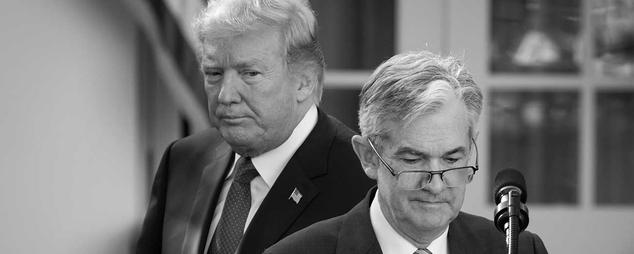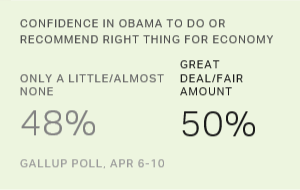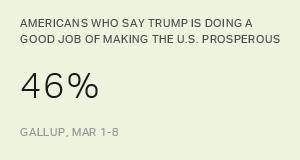Story Highlights
- 45% confident in new Fed chairman's economic leadership
- Trump fails to earn majority confidence for second straight year
- Only fifth time in 18 years no federal economic leader rated 50% or better
WASHINGTON, D.C. -- For only the fifth time in 18 years, none of the key federal leaders whose job includes managing the U.S. economy earn majority confidence from Americans for their economic leadership. Just over four in 10 U.S. adults have "a great deal" or "a fair amount" of confidence in newly installed Federal Reserve Chairman Jerome Powell (45%), the Democratic leaders in Congress (44%) and President Donald Trump (42%) to "do or recommend the right thing for the economy." Slightly fewer, 38%, have this much confidence in congressional Republican leaders.
| Great deal/Fair amount | Only a little/Almost none | No opinion | |||||||||||||||||||||||||||||||||||||||||||||||||||||||||||||||||||||||||||||||||||||||||||||||||
|---|---|---|---|---|---|---|---|---|---|---|---|---|---|---|---|---|---|---|---|---|---|---|---|---|---|---|---|---|---|---|---|---|---|---|---|---|---|---|---|---|---|---|---|---|---|---|---|---|---|---|---|---|---|---|---|---|---|---|---|---|---|---|---|---|---|---|---|---|---|---|---|---|---|---|---|---|---|---|---|---|---|---|---|---|---|---|---|---|---|---|---|---|---|---|---|---|---|---|---|
| % | % | % | |||||||||||||||||||||||||||||||||||||||||||||||||||||||||||||||||||||||||||||||||||||||||||||||||
| Federal Reserve Chairman Jerome Powell | 45 | 35 | 21 | ||||||||||||||||||||||||||||||||||||||||||||||||||||||||||||||||||||||||||||||||||||||||||||||||
| The Democratic leaders in Congress | 44 | 52 | 3 | ||||||||||||||||||||||||||||||||||||||||||||||||||||||||||||||||||||||||||||||||||||||||||||||||
| President Donald Trump | 42 | 57 | 2 | ||||||||||||||||||||||||||||||||||||||||||||||||||||||||||||||||||||||||||||||||||||||||||||||||
| The Republican leaders in Congress | 38 | 60 | 2 | ||||||||||||||||||||||||||||||||||||||||||||||||||||||||||||||||||||||||||||||||||||||||||||||||
| Gallup, April 2-11, 2018 | |||||||||||||||||||||||||||||||||||||||||||||||||||||||||||||||||||||||||||||||||||||||||||||||||||
A dearth of national confidence in all four major federal economic leaders isn't new, though it isn't the norm. In most years, the U.S. president, at least, has earned a 50% or better confidence rating from Americans. Trump has failed to do that in either of his years in office. This was also the case for Barack Obama in 2014 and George W. Bush from 2006 through 2008.
Since 2001, there have been four other times -- 2006, 2008, 2014 and 2017 -- when less than half of Americans had a great deal or fair amount of confidence in what all four leaders were doing on the economy. In all of these years, confidence in the president was below the majority level. In 2007, when less than a majority were confident in Bush as the Iraq War wore on, a majority were confident in the Democratic leaders in Congress and half were confident in then-Fed Chairman Ben Bernanke.
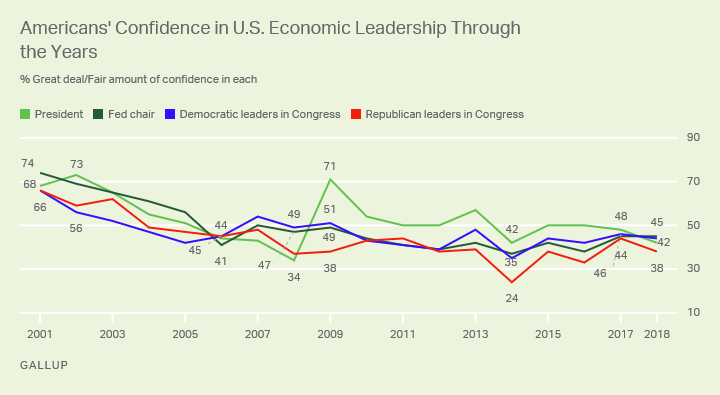
Since the origin of this trend in 2001, the sitting president has averaged the highest economic confidence rating of the four leaders, at 53%. Next is the sitting Fed chair, at 49%; then Democratic leaders in Congress, at 47%; and lastly, Republican leaders in Congress, at 44%.
The average of Americans' confidence in the four economic actors in the latest survey, conducted April 2-11, is 42%. That is down slightly from 46% a year ago, but similar to the 41% and 44% readings in the two prior years. The trend low of 35% came in April 2014, reflecting especially poor ratings across the board. This may have stemmed from the federal government shutdown in late 2013. The high point, 69%, was recorded in April 2001, at the start of the Bush administration, when the popular Alan Greenspan was still Fed chairman.
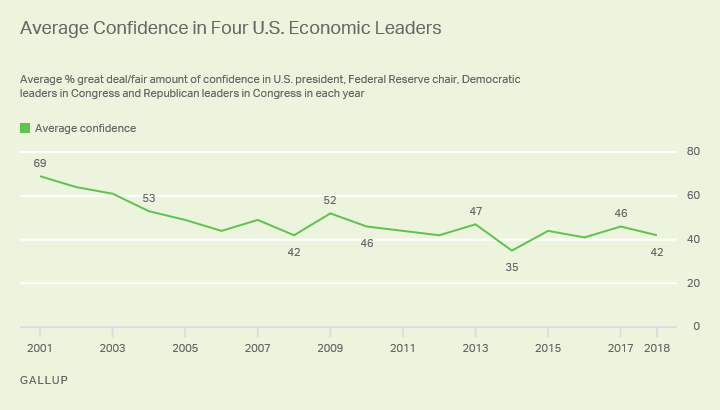
Americans' confidence in the United States' economic leadership does not appear to be closely linked to the economy's performance. The average confidence rating started out strong in the early 2000s, but its decline over the next six years may have been as much about growing dissatisfaction with Bush owing to the Iraq War as about the nation's slide into the 2007-2009 recession.
The average economic leadership rating improved markedly in 2009, mainly because of a surge of optimism around then-newly elected President Obama -- even though the economy was still struggling at that point after the 2008 Wall Street financial crisis. After declining to 46% in Obama's second year, average confidence in leadership has remained mostly near this level, with no meaningful improvement despite gradual improvement in the nation's GDP, unemployment rate, stock market and other economic signals.
Trump's Rating Matches Obama's Lowest
Trump's sub-50% economic confidence ratings in 2017 and 2018 are well below the strongly positive economic ratings of Bush (68%) and Obama (71%) at the start of their presidencies. However, Trump's initial ratings of 48% in 2017 and 42% this year are on par with Obama's lowest rating, recorded in 2014, and with Bush's 2006 and 2007 ratings. Trump's ratings are still better than Bush's worst rating, 34%, recorded in 2008, during the Great Recession.
Powell took over from Janet Yellen as Fed chairman two months ago, and the percentage of Americans expressing a great deal or fair amount of confidence in his abilities on the economy, 45%, exceeds Yellen's initial confidence rating of 37% in 2014. This is largely because Democrats today express more confidence in the Republican-appointed Powell than Republicans did in the Democratic-appointed Yellen.
Powell's initial rating is similar to Ben Bernanke's in 2006, though fewer have no opinion about Powell than did about Bernanke in his inaugural rating. Although Bernanke presided over some particularly challenging economic times, including the 2007 to 2009 recession, his average confidence rating of 44% slightly exceeds Yellen's 41%.
Greenspan, who led the Fed from 1987 to 2006 and was much better known than his successors, received the highest confidence ratings of all recent Fed leaders in Gallup's annual readings since 2001, averaging 65%.
| Great deal/Fair amount | Only a little/None | No opinion | ||||||||||||||||||||||||||||||||||||||||||||||||||||||||||||||||||||||||||||||||||||||||||||||||||
|---|---|---|---|---|---|---|---|---|---|---|---|---|---|---|---|---|---|---|---|---|---|---|---|---|---|---|---|---|---|---|---|---|---|---|---|---|---|---|---|---|---|---|---|---|---|---|---|---|---|---|---|---|---|---|---|---|---|---|---|---|---|---|---|---|---|---|---|---|---|---|---|---|---|---|---|---|---|---|---|---|---|---|---|---|---|---|---|---|---|---|---|---|---|---|---|---|---|---|---|---|
| % | % | % | ||||||||||||||||||||||||||||||||||||||||||||||||||||||||||||||||||||||||||||||||||||||||||||||||||
| Jerome Powell | ||||||||||||||||||||||||||||||||||||||||||||||||||||||||||||||||||||||||||||||||||||||||||||||||||||
| 2018 Apr 2-11 | 45 | 35 | 21 | |||||||||||||||||||||||||||||||||||||||||||||||||||||||||||||||||||||||||||||||||||||||||||||||||
| Janet Yellen | ||||||||||||||||||||||||||||||||||||||||||||||||||||||||||||||||||||||||||||||||||||||||||||||||||||
| 2017 Apr 5-9 | 45 | 29 | 26 | |||||||||||||||||||||||||||||||||||||||||||||||||||||||||||||||||||||||||||||||||||||||||||||||||
| 2016 Apr 6-10 | 38 | 35 | 26 | |||||||||||||||||||||||||||||||||||||||||||||||||||||||||||||||||||||||||||||||||||||||||||||||||
| 2015 Apr 9-12 | 42 | 31 | 27 | |||||||||||||||||||||||||||||||||||||||||||||||||||||||||||||||||||||||||||||||||||||||||||||||||
| 2014 Apr 3-6 | 37 | 43 | 20 | |||||||||||||||||||||||||||||||||||||||||||||||||||||||||||||||||||||||||||||||||||||||||||||||||
| Ben Bernanke | ||||||||||||||||||||||||||||||||||||||||||||||||||||||||||||||||||||||||||||||||||||||||||||||||||||
| 2013 Apr 4-7 | 42 | 38 | 20 | |||||||||||||||||||||||||||||||||||||||||||||||||||||||||||||||||||||||||||||||||||||||||||||||||
| 2012 Apr 9-12 | 39 | 46 | 15 | |||||||||||||||||||||||||||||||||||||||||||||||||||||||||||||||||||||||||||||||||||||||||||||||||
| 2011 Apr 7-11 | 41 | 42 | 17 | |||||||||||||||||||||||||||||||||||||||||||||||||||||||||||||||||||||||||||||||||||||||||||||||||
| 2010 Apr 8-11 | 44 | 39 | 18 | |||||||||||||||||||||||||||||||||||||||||||||||||||||||||||||||||||||||||||||||||||||||||||||||||
| 2009 Apr 6-9 | 49 | 35 | 17 | |||||||||||||||||||||||||||||||||||||||||||||||||||||||||||||||||||||||||||||||||||||||||||||||||
| 2008 Apr 6-9 | 47 | 34 | 19 | |||||||||||||||||||||||||||||||||||||||||||||||||||||||||||||||||||||||||||||||||||||||||||||||||
| 2007 Apr 2-5 | 50 | 25 | 25 | |||||||||||||||||||||||||||||||||||||||||||||||||||||||||||||||||||||||||||||||||||||||||||||||||
| 2006 Apr 10-13 | 41 | 26 | 34 | |||||||||||||||||||||||||||||||||||||||||||||||||||||||||||||||||||||||||||||||||||||||||||||||||
| Alan Greenspan | ||||||||||||||||||||||||||||||||||||||||||||||||||||||||||||||||||||||||||||||||||||||||||||||||||||
| 2005 Apr 4-7 | 56 | 34 | 10 | |||||||||||||||||||||||||||||||||||||||||||||||||||||||||||||||||||||||||||||||||||||||||||||||||
| 2004 Apr 5-8 | 61 | 30 | 9 | |||||||||||||||||||||||||||||||||||||||||||||||||||||||||||||||||||||||||||||||||||||||||||||||||
| 2003 Apr 7-9 | 65 | 25 | 10 | |||||||||||||||||||||||||||||||||||||||||||||||||||||||||||||||||||||||||||||||||||||||||||||||||
| 2002 Apr 8-11 | 69 | 20 | 11 | |||||||||||||||||||||||||||||||||||||||||||||||||||||||||||||||||||||||||||||||||||||||||||||||||
| 2001 Apr 6-8 | 74 | 16 | 10 | |||||||||||||||||||||||||||||||||||||||||||||||||||||||||||||||||||||||||||||||||||||||||||||||||
| Gallup | ||||||||||||||||||||||||||||||||||||||||||||||||||||||||||||||||||||||||||||||||||||||||||||||||||||
Bottom Line
For most of the past 18 years, either the president or the Fed chair has inspired confidence from a majority of Americans that they can manage the economy. The country has lacked such a person this year and last, as both Trump and Fed chairs Yellen and Powell have failed to reach that threshold.
Powell, who is new to the job, has the opportunity to build upon the public's confidence in his abilities over time. The Republican leaders in Congress have typically lagged behind the other economic players in public perceptions of their economic competence; that trend continues today.
Survey Methods
Results for this Gallup poll are based on telephone interviews conducted April 2-11, 2018, with a random sample of 1,015 adults, aged 18 and older, living in all 50 U.S. states and the District of Columbia. For results based on the total sample of national adults, the margin of sampling error is ±4 percentage points at the 95% confidence level. All reported margins of sampling error include computed design effects for weighting.
Each sample of national adults includes a minimum quota of 70% cellphone respondents and 30% landline respondents, with additional minimum quotas by time zone within region. Landline and cellular telephone numbers are selected using random-digit-dial methods.
View survey methodology, complete question responses and trends.
Learn more about how the Gallup Poll Social Series works.
